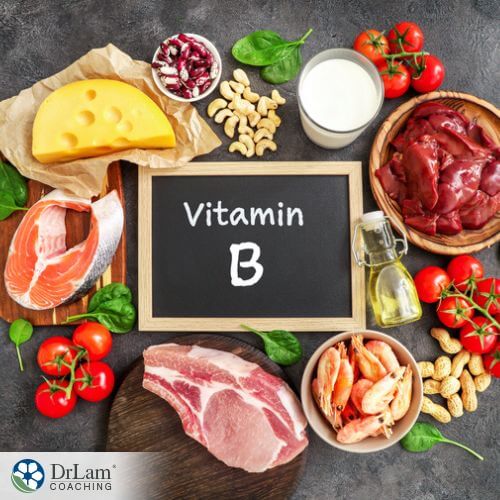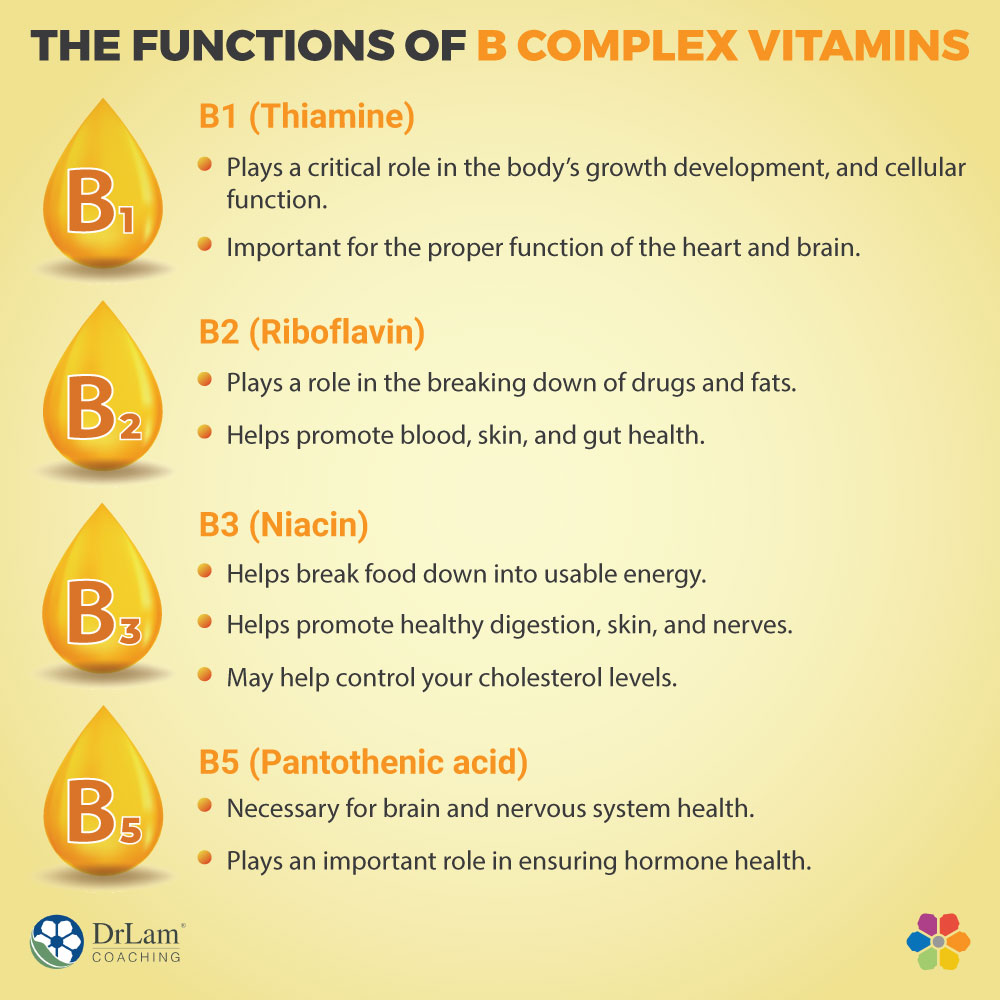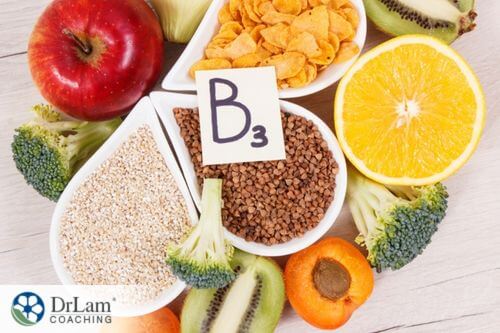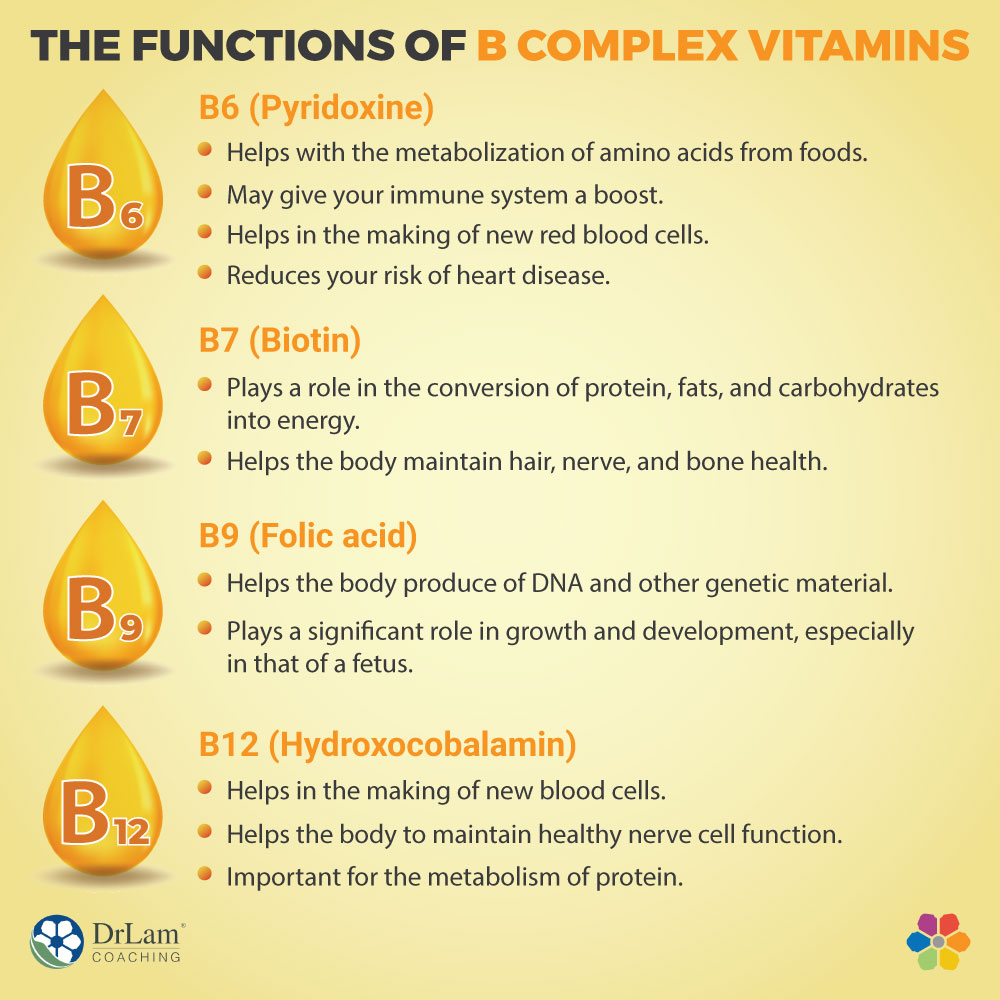 Eating a healthy diet means getting enough vitamins and minerals to keep your body working at an optimum level. However, we often found ourselves in a position where the body does not get enough of these necessary components. This may lead to a variety of symptoms and related health issues. The B complex vitamins are essential vitamins that many people do not get enough of. Deficiency can cause a host of common symptoms, including fatigue, confusion, irritability, constipation, and headaches. That's why it's important to make sure you are getting enough.
Eating a healthy diet means getting enough vitamins and minerals to keep your body working at an optimum level. However, we often found ourselves in a position where the body does not get enough of these necessary components. This may lead to a variety of symptoms and related health issues. The B complex vitamins are essential vitamins that many people do not get enough of. Deficiency can cause a host of common symptoms, including fatigue, confusion, irritability, constipation, and headaches. That's why it's important to make sure you are getting enough.
A vitamin B complex supplement contains eight different vitamins. The vitamins in a B complex supplement include vitamins:
Together, these B vitamins play a vital role in the conversion of food into energy and red blood cell formation. However, the manufacture of these supplements is not regulated. Each brand may have its own percentage of each of these B vitamins.

A B complex vitamin should ideally contain the eight vitamins mentioned above. Although all have to do with the conversion of food into energy, each has several additional crucial functions as well.
Vitamin B1 is also known as thiamine. Thiamine plays a critical role in the body’s growth and development, as well as cellular function. It is particularly important for the proper function of the heart and brain.
If you do not get enough vitamin B1 from your diet, you risk contracting beriberi. This condition, common in malnourished people, affects the heart, nervous system, and digestive system. Symptoms of beriberi include a loss of sensation in both your hands and feet, walking difficulties, and possible paralysis of your lower extremities. People who consume large quantities of alcohol also have a higher risk of contracting this condition.
Good food sources of this vitamin include nuts, meat, beans, and whole grains.
Vitamin B2, or riboflavin, plays a role in the breaking down of drugs and fats. Essentially, the vitamin helps your body break down the carbohydrates, fats, and proteins you eat and turn them into an energy source. It also helps promote blood, skin, and gut health. Furthermore, vitamin B2 converts vitamin B6 into a usable form while helping with the vitamin’s production. It also helps boost your immune health. This vitamin may also help counteract muscle cramps, acne, carpal tunnel syndrome, and boost your energy levels.
Symptoms associated with low vitamin B2 levels include an increase in migraines and cataract formation.
Good vitamin B2 food sources include dairy products, meat, nuts, and leafy green vegetables.
Your body needs vitamin B3 to help break food down into usable energy. Also called niacin or nicotinic acid, this vitamin helps promote healthy digestion, skin, and nerves. Higher consumption of this vitamin may help control your cholesterol levels. However, you should only consider this course of action with the guidance of a healthcare professional.
 Lower vitamin B3 levels may result in pellagra, a disorder with symptoms that include mental health issues like dementia, inflamed mucus membranes, and gut health issues like diarrhea. People who drink excessive amounts of alcohol may also develop this condition.
Lower vitamin B3 levels may result in pellagra, a disorder with symptoms that include mental health issues like dementia, inflamed mucus membranes, and gut health issues like diarrhea. People who drink excessive amounts of alcohol may also develop this condition.
Food sources high in vitamin B3 include dairy products, lean meats, fish, nuts, and legumes.
Vitamin B5, also called pantothenic acid, is necessary for the health of both the brain and nervous system. It also plays an important role in ensuring hormone health. The vitamin helps your body break down fats and carbohydrates so they can be used as an energy source. It also helps your body better use other vitamins like vitamin B2.
Foods high in this vitamin include leafy greens like broccoli and kale, organ meats, dairy products, potatoes, whole grains, and avocado.
Vitamin B6, or pyridoxine, helps with the metabolization of amino acids from foods because of its involvement in over one hundred enzyme reactions in the cells of your body. It may give your immune system a boost and help in the making of new red blood cells. The vitamin may also reduce your risk of heart disease.
A deficiency in this vitamin may result in symptoms that include irritability, depression, concentration difficulties, memory loss, and muscle weakness.
Food sources high in vitamin B6 include oily fish like salmon or tuna, leafy green vegetables like spinach, dairy products, sunflower seeds, whole grains, lentils, chicken and turkey, beef liver, beans, bananas, and carrots.
Vitamin B7, also referred to as biotin, plays a role in the conversion of protein, fats, and carbohydrates from food into energy. Your body also needs it to make fatty acids, and to maintain hair, nerve, and bone health. Furthermore, lower levels of this vitamin may be associated with birth defects. Literature suggests it may play a role in blood glucose management.
Low levels of this vitamin may result in a variety of symptoms that include lethargy, depression, immune system dysfunction, an increased risk of bacterial and fungal infections, seizures, and alopecia.
Food choices high in vitamin B7 include organ meats, eggs, sunflower seeds, fatty fish like salmon, dairy products like cheese, legumes, sweet potatoes, nuts, avocados, and mushrooms.
 Your body needs vitamin B9, also known as folate or folic acid, for the production of DNA and other genetic material. It plays a significant role in growth and development, especially in that of a fetus. Pregnant women usually need to take folic acid to help with fetal development and prevent brain and spine birth defects. Together with vitamin B12, it also plays a role in regulating the manufacture of red blood cells in your body.
Your body needs vitamin B9, also known as folate or folic acid, for the production of DNA and other genetic material. It plays a significant role in growth and development, especially in that of a fetus. Pregnant women usually need to take folic acid to help with fetal development and prevent brain and spine birth defects. Together with vitamin B12, it also plays a role in regulating the manufacture of red blood cells in your body.
Symptoms associated with low levels of vitamin B9 include fatigue, muscle weakness, psychological issues that include depression and loss of memory, and pins and needles or numbness in your hands and feet.
Food sources that contain relatively high amounts of vitamin B9 include asparagus, leafy green vegetables, beans, peas, beans, nuts, and oranges.
Your body needs vitamin B12, or cobalamin, to help in the making of new blood cells and to maintain healthy nerve cell function. It is also important for the metabolism of protein.
Pregnant or breastfeeding women, as well as vegans and vegetarians, are more at risk of having lower levels of this vitamin. Symptoms of lower vitamin B12 levels include anemia, dementia, irritability, depression, pins and needles, issues with vision, mouth ulcers, and skin that turns a pale yellow color.
Foods high in this vitamin include fish, red meat, beef liver, dairy products, spinach, potatoes, mushrooms, and beetroot.

One common condition connected to vitamin deficiency is stress.
Prolonged stress can result in adrenal fatigue. This is because your body’s NeuroEndoMetabolic (NEM) stress response asks for a prolonged increase in stress hormone production from your adrenals to address the stressor. As a result, the body does not get a chance to rest and repair itself. At the same time, functions decreased or stopped during the time of stress do not have a chance to return to normal. Adrenal fatigue, with its myriad symptoms, may result.
Your B complex vitamins play a vital role in protecting your body from stress. They help with numerous hormone, brain, and other functions. Most of these occur at a cellular level.
Unfortunately, a body under stress may become deficient in its B complex vitamins due to them being used up to counteract the stress. Stress may also negatively affect your body’s ability to absorb these nutrients from the foods you eat. As a result, people with higher stress levels or who suffer from adrenal fatigue often find they have low B complex vitamin levels.
In this case, taking a B complex vitamin supplement may help address symptoms, as well as your stress levels. It may also help supply some much-needed adrenal support.
Many of the B complex vitamins work in synergy. One vitamin complements or increases the efficacy of others. This is one reason to opt for a B complex supplement instead of taking one of the B vitamins alone.
If you have high stress levels, your body may find it difficult to derive these vitamins from food. Taken as a supplement, these vitamins might be easier to digest.
While your body does not retain B complex supplements for lengthy periods, when taken in large dosages, you may experience side effects. Taking just one B vitamin for an extended period may also have side effects. This is because it may cause an imbalance with the other B vitamins.
 Higher levels of the following B vitamins could result in the following issues:
Higher levels of the following B vitamins could result in the following issues:
Please note that some people may have sensitivities to certain B vitamins and could have mild to severe contraindications. Those with adrenal fatigue can sometimes become sensitive to stimulating vitamins like B Complex if their liver and extracellular matrix are congested and full of toxins.
Finally, although considered a relatively safe supplement, please only use a vitamin B complex or any other supplement after consulting with a healthcare provider. This is especially true if you have adrenal fatigue and are prone to paradoxical reactions. A doctor is best able to determine suitability and dosage.
The eight B complex vitamins play many roles in your body and are needed to prevent health problems. They work together, so taking a combination supplement may be more effective than taking individual B vitamins. You can also get them from food.
If you would like to know more about the safe use of a vitamin B complex supplement, the team at Dr. Lam Coaching can help. We offer a free** no-obligation consultation at +1 (626) 571-1234 where we privately discuss any issues and your options. You can also contact us through our Ask The Doctor system by clicking here.
A vitamin B complex supplement may offer some much-needed adrenal support while helping to address stress. However, food sources are usually safest. Your healthcare provider is best able to determine whether you need a supplement and the dosage best for you.